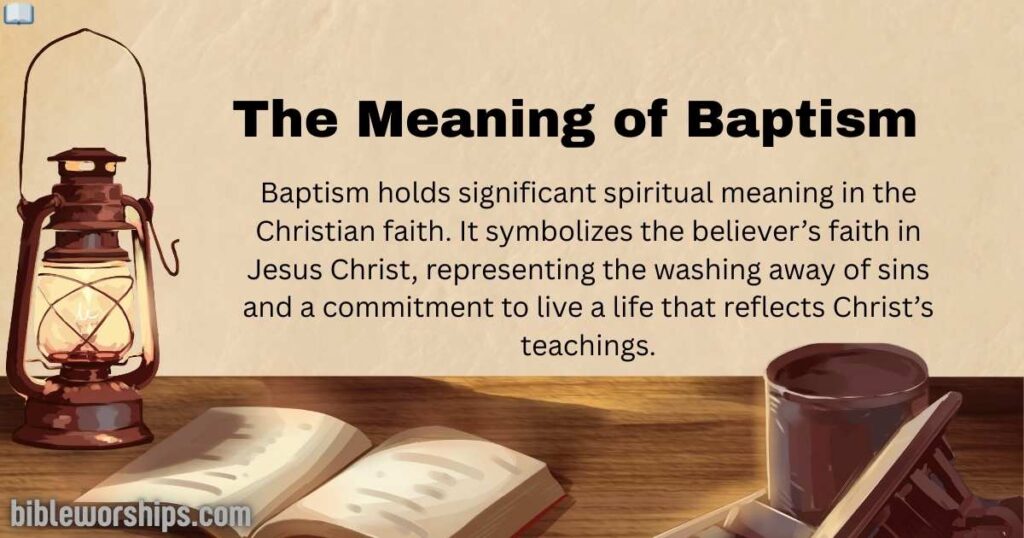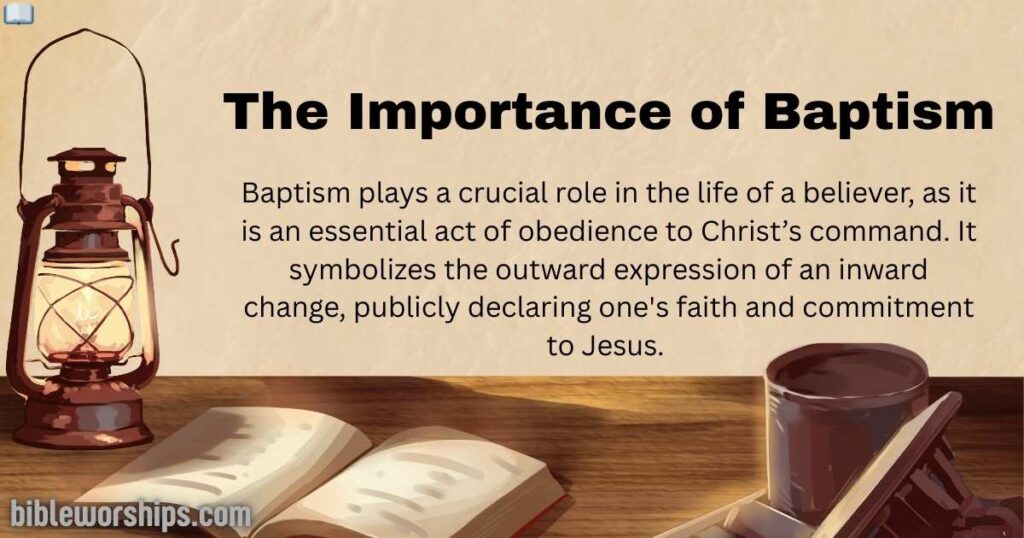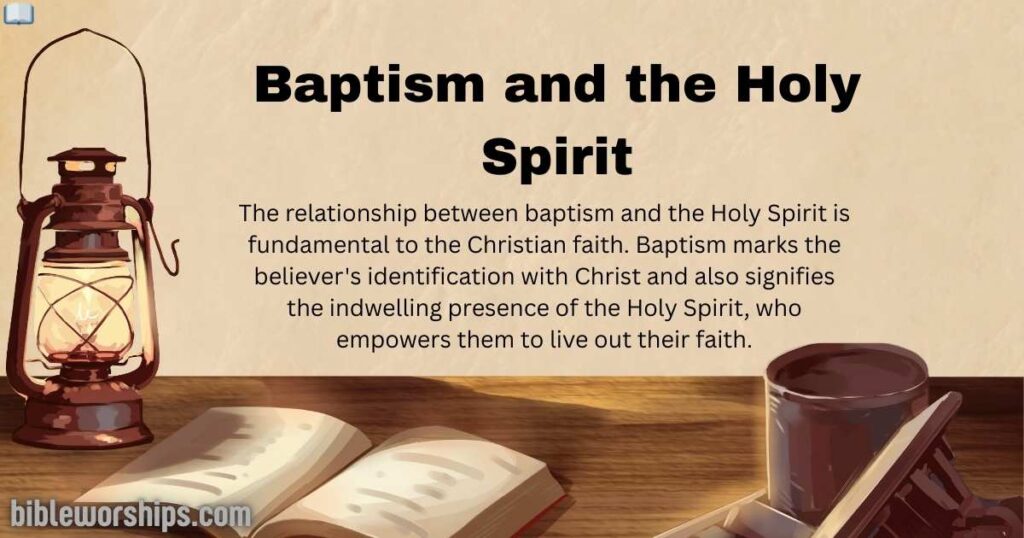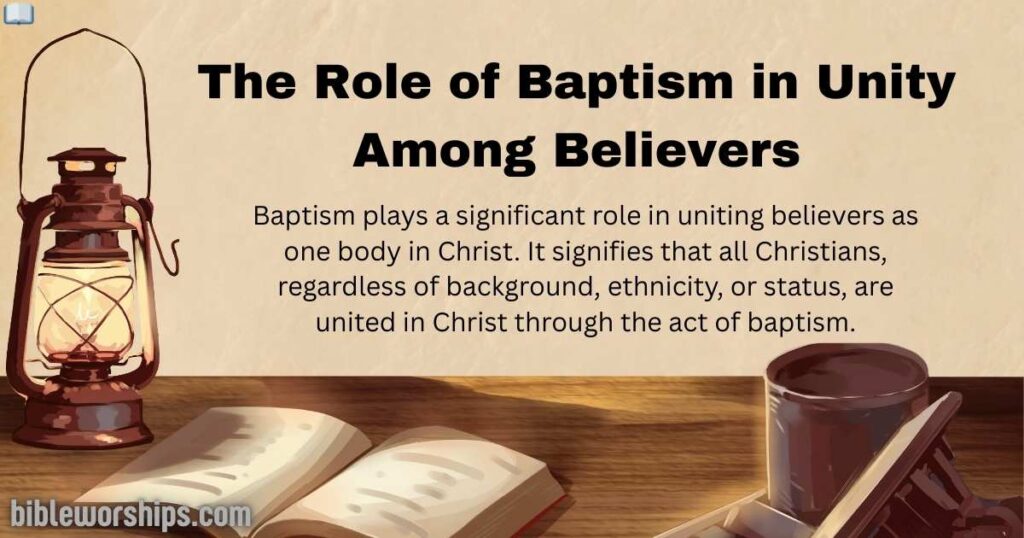Discover the powerful wisdom in the {55 Bible Verses About Baptism}! These verses are not just words, but a source of spiritual encouragement and strength for anyone seeking to understand the importance of baptism in their faith journey. Baptism is a beautiful act of obedience that signifies a fresh start and a deeper connection with God, and these verses highlight its profound spiritual significance.
While the Bible may not explicitly address every detail of baptism, it offers rich insights into the transformative power of this sacred act. This article is designed to inspire and guide you, offering verses that will help deepen your understanding and strengthen your relationship with Christ. Let the truth of God’s word transform your heart as you explore these verses, and experience the peace and joy that comes with embracing the meaning of baptism.
1. The Meaning of Baptism

Baptism holds significant spiritual meaning in the Christian faith. It symbolizes the believer’s faith in Jesus Christ, representing the washing away of sins and a commitment to live a life that reflects Christ’s teachings. Baptism is not just a religious act, but a powerful declaration of a new beginning in the believer’s journey with God. It is a public testimony of inner transformation and a vital step in following Christ.
Matthew 28:19
“Go therefore and make disciples of all nations, baptizing them in the name of the Father and of the Son and of the Holy Spirit.”
This verse underscores the importance of baptism as a command from Jesus Himself. It highlights the essential role baptism plays in the process of making disciples, marking the beginning of one’s commitment to God and being united with the Triune God.
Acts 2:38
“And Peter said to them, ‘Repent and be baptized every one of you in the name of Jesus Christ for the forgiveness of your sins, and you will receive the gift of the Holy Spirit.’”
Peter emphasizes that baptism is an act of repentance and faith. It is through baptism that believers publicly declare their acceptance of Christ’s forgiveness, symbolizing the removal of their sins and the receiving of the Holy Spirit.
Romans 6:4
“We were therefore buried with him through baptism into death in order that, just as Christ was raised from the dead through the glory of the Father, we too may live a new life.”
This verse beautifully expresses the symbolic act of baptism as being united with Christ in His death and resurrection. Baptism signifies the believer’s new life, leaving behind the old self and rising to walk in the newness of Christ’s resurrection power.
Galatians 3:27
“For all of you who were baptized into Christ have clothed yourselves with Christ.”
Baptism is seen as an act of spiritual transformation, where believers metaphorically “put on” Christ. It represents the believer’s identification with Christ, embracing His righteousness and grace.
1 Peter 3:21
“And this water symbolizes baptism that now saves you also—not the removal of dirt from the body but the pledge of a good conscience toward God. It saves you by the resurrection of Jesus Christ.”
This verse highlights that baptism is not merely a physical act but a spiritual commitment. It points to the transformative power of Christ’s resurrection, which makes baptism a symbol of salvation and a pledge to live with a clear conscience before God.
2. The Baptism of Jesus
The baptism of Jesus is a pivotal moment in His ministry. It marks the beginning of His public ministry and reveals His obedience to the Father’s will. By undergoing baptism, Jesus set the example for all believers, demonstrating humility and a willingness to identify with humanity’s sins, even though He was sinless. His baptism also marks the outpouring of the Holy Spirit, further showing the divine approval of His mission.
Matthew 3:13
“Then Jesus came from Galilee to the Jordan to be baptized by John.”
In this verse, we see Jesus taking the step of humility to be baptized by John the Baptist. Despite being sinless, Jesus chose to identify with humanity and fulfill all righteousness. This act marked the beginning of His earthly ministry.
Luke 3:21
“When all the people were being baptized, Jesus was baptized too. And as he was praying, heaven was opened.”
This passage reveals a significant moment when Jesus, after being baptized, was praying, and heaven was opened. This moment not only signifies Jesus’ obedience to the Father but also foreshadows the coming of the Holy Spirit.
Mark 1:9
“At that time Jesus came from Nazareth in Galilee and was baptized by John in the Jordan.”
Mark records Jesus’ physical journey to the Jordan River, reinforcing the significance of His baptism. This act was the public declaration of Jesus’ readiness to begin His divine mission on earth.
John 1:33
“I myself did not know him, but the one who sent me to baptize with water told me, ‘The man on whom you see the Spirit come down and remain is the one who will baptize with the Holy Spirit.’”
John the Baptist shares his testimony of recognizing Jesus as the Messiah. This verse connects the baptism of Jesus with the anointing of the Holy Spirit, signaling the beginning of a new era of grace and salvation.
Acts 1:5
“For John baptized with water, but in a few days you will be baptized with the Holy Spirit.”
This verse reflects on the transition from water baptism to spiritual baptism. It points to the coming empowerment of the Holy Spirit, which believers would experience after Jesus’ ascension, following the model set by Jesus’ own baptism.
3. The Importance of Baptism

Baptism plays a crucial role in the life of a believer, as it is an essential act of obedience to Christ’s command. It symbolizes the outward expression of an inward change, publicly declaring one’s faith and commitment to Jesus. Baptism is not only a command but a celebration of salvation and spiritual renewal. It marks the believer’s initiation into the community of faith and represents the believer’s union with Christ in His death, burial, and resurrection.
Acts 2:41
“So those who received his word were baptized, and there were added that day about three thousand souls.”
This verse emphasizes the significance of baptism in the early church. It shows that those who accepted the message of salvation through Christ were immediately baptized, signifying the acceptance of Jesus into their lives.
Acts 8:36
“And as they were going along the road, they came to some water, and the eunuch said, ‘See, here is water! What prevents me from being baptized?’”
The urgency of baptism is reflected in this verse. The Ethiopian eunuch recognized the immediate need to be baptized, indicating that baptism is a crucial step in accepting Christ’s message and committing to faith.
Acts 9:18
“And immediately something like scales fell from his eyes, and he regained his sight. Then he rose and was baptized.”
After Saul’s (later Paul) encounter with Christ, baptism was an immediate next step in his transformation. It symbolizes the healing and restoration that come with accepting Christ, as well as the beginning of a new life.
Acts 10:48
“And he commanded them to be baptized in the name of Jesus Christ. Then they asked him to remain for some days.”
Peter commands the Gentiles to be baptized, illustrating that baptism is not just for Jews but for all who believe. This highlights the inclusive nature of the Gospel and the importance of baptism in the universal call to salvation.
Acts 16:15
“And after she was baptized, and her household as well, she urged us, saying, ‘If you have judged me to be faithful to the Lord, come to my house and stay.’ And she prevailed upon us.”
Lydia’s baptism, along with her household, shows how baptism serves as an initiation into a life of faith, a communal act that also strengthens fellowship among believers.
4. Baptism and Salvation
Baptism is closely tied to salvation in the Bible. It is a symbolic act that represents the believer’s faith in Jesus Christ, the acceptance of His sacrifice, and the reception of His grace. Baptism signifies the believer’s participation in the death, burial, and resurrection of Christ. This section explores how baptism plays a vital role in the salvation process and is an outward sign of an inward transformation.
John 3:22
“After this, Jesus and his disciples went into the Judean countryside, and there he remained with them and was baptizing.”
This verse connects baptism with the ministry of Jesus, showing that He was directly involved in the act. It illustrates that baptism was a significant part of Jesus’ message, pointing to salvation through faith and obedience.
John 4:1-2
“Now when Jesus learned that the Pharisees had heard that Jesus was making and baptizing more disciples than John (although Jesus himself did not baptize, but only his disciples),”
This passage highlights the importance of baptism in the early ministry of Jesus. Even though Jesus Himself did not baptize, His disciples were, showing that baptism was integral to the ministry of the early church and the proclamation of the gospel.
Acts 2:41
“So those who received his word were baptized, and there were added that day about three thousand souls.”
This verse further stresses the link between baptism and salvation. Those who accepted the message of the Gospel through Peter’s preaching were baptized as an outward expression of their faith and commitment to Christ.
Acts 22:16
“And now why do you wait? Rise and be baptized and wash away your sins, calling on his name.”
Paul’s conversion story includes the command to be baptized as a way to wash away sins and publicly acknowledge faith in Christ. This verse underlines that baptism is not just symbolic but a transformative act of salvation.
Romans 10:9
“If you confess with your mouth that Jesus is Lord and believe in your heart that God raised him from the dead, you will be saved.”
While not directly mentioning baptism, this verse connects the process of salvation with confession and belief in Jesus Christ, which baptism serves to outwardly express. Baptism is the public declaration of this inner faith and trust in Jesus for salvation.
5. Baptism in the Early Church

The practice of baptism was fundamental to the early Christian church, serving as both an individual act of faith and a communal experience. The apostles and early believers regarded baptism as an essential step in joining the body of Christ. This section reflects how baptism was practiced in the early church, emphasizing its communal and transformative nature.
Acts 8:13
“Even Simon himself believed, and after being baptized, he continued with Philip. And seeing signs and great miracles performed, he was amazed.”
Simon the sorcerer’s baptism highlights that baptism was a pivotal moment in the life of early believers. It demonstrated a shift from unbelief to faith in Christ and a public acknowledgment of the Gospel.
Acts 9:18
“And immediately something like scales fell from his eyes, and he regained his sight. Then he rose and was baptized.”
Saul’s baptism was an act of spiritual rebirth. After his encounter with Christ, baptism served as an outward symbol of his complete transformation, marking the beginning of his new life as Paul, the Apostle.
Acts 16:33
“And he took them the same hour of the night and washed their wounds; and he was baptized at once, he and all his family.”
The jailer’s baptism, along with his family, reflects the immediate decision to follow Christ after hearing the gospel. It highlights the power of baptism in transforming lives and uniting families in faith.
Acts 18:8
“Crispus, the ruler of the synagogue, believed in the Lord, together with his entire household. And many of the Corinthians hearing Paul believed and were baptized.”
Crispus and his household were baptized, demonstrating how the gospel message spread and led to whole households coming to faith. It illustrates the role of baptism in establishing strong Christian communities.
Romans 6:3
“Do you not know that all of us who have been baptized into Christ Jesus were baptized into his death?”
This verse emphasizes the connection between baptism and the death of Christ. Through baptism, believers symbolically identify with Christ’s death, signifying the end of their old sinful lives and the beginning of a new life in Christ.
6. The Power of Baptism in Transforming Lives
Baptism serves as a powerful symbol of personal transformation, representing the believer’s decision to turn away from sin and embrace a new life in Christ. Through baptism, one publicly acknowledges God’s grace and mercy, symbolizing the washing away of sins and the beginning of a new spiritual journey.
Romans 6:4
“We were therefore buried with him through baptism into death in order that, just as Christ was raised from the dead through the glory of the Father, we too may live a new life.”
This verse perfectly illustrates the transformative power of baptism. It is not merely a ritual but a spiritual act that signifies the believer’s new life, united with Christ in His resurrection.
Acts 2:38
“And Peter said to them, ‘Repent and be baptized every one of you in the name of Jesus Christ for the forgiveness of your sins, and you will receive the gift of the Holy Spirit.’”
This verse highlights the dual transformation that occurs through baptism: the forgiveness of sins and the reception of the Holy Spirit. Baptism is a crucial step in embracing God’s grace and beginning a life of spiritual renewal.
Ephesians 4:22-24
“To put off your old self, which belongs to your former manner of life and is corrupt through deceitful desires, and to be renewed in the spirit of your minds, and to put on the new self, created after the likeness of God in true righteousness and holiness.”
Baptism symbolizes the believer’s decision to put off the old self, embracing a new identity in Christ. This transformation is both spiritual and moral, as the individual is renewed by the Holy Spirit and empowered to live in righteousness.
1 Peter 3:21
“Baptism, which corresponds to this, now saves you, not as a removal of dirt from the body but as an appeal to God for a good conscience, through the resurrection of Jesus Christ.”
This passage emphasizes that baptism is a call to God, seeking His approval and the cleansing of one’s conscience. Baptism represents a commitment to a new way of living, as a direct result of Christ’s resurrection.
Colossians 2:12
“Having been buried with him in baptism, in which you were also raised with him through faith in the powerful working of God, who raised him from the dead.”
Baptism is a profound act that symbolizes the believer’s identification with Christ’s death and resurrection. It is an expression of faith, relying on God’s power to transform and raise the believer to new life.
7. Baptism and the Holy Spirit

The relationship between baptism and the Holy Spirit is fundamental to the Christian faith. Baptism marks the believer’s identification with Christ and also signifies the indwelling presence of the Holy Spirit, who empowers them to live out their faith. The Holy Spirit is both the means by which baptism occurs and the agent of transformation in the life of the believer. This section explores the vital role the Holy Spirit plays in baptism.
Acts 2:38
“And Peter said to them, ‘Repent and be baptized every one of you in the name of Jesus Christ for the forgiveness of your sins, and you will receive the gift of the Holy Spirit.’”
Peter’s words here show that baptism is directly connected to the reception of the Holy Spirit. Upon being baptized, believers are promised the gift of the Holy Spirit, empowering them for a life of holiness and service.
Matthew 3:11
“I baptize you with water for repentance. But he who is coming after me is mightier than I, whose sandals I am not worthy to carry. He will baptize you with the Holy Spirit and fire.”
John the Baptist distinguishes between water baptism and the baptism of the Holy Spirit. This passage highlights the Holy Spirit’s role in the life of believers, suggesting that while water baptism symbolizes repentance, the baptism of the Holy Spirit empowers the believer for righteous living.
John 14:17
“Even the Spirit of truth, whom the world cannot receive, because it neither sees him nor knows him. You know him, for he dwells with you and will be in you.”
In this verse, Jesus promises the indwelling of the Holy Spirit after His ascension. The Holy Spirit’s presence is essential for the believer’s life, equipping them to live according to God’s will and to bear witness to the gospel.
Acts 10:44-48
“While Peter was still saying these things, the Holy Spirit fell on all who heard the word. And the believers from among the circumcised who had come with Peter were amazed, because the gift of the Holy Spirit was poured out even on the Gentiles. For they were hearing them speaking in tongues and extolling God. Then Peter declared, ‘Can anyone withhold water for baptizing these people, who have received the Holy Spirit just as we have?’”
This passage highlights that the Holy Spirit’s presence is not confined to the Jewish believers but is available to all. The Gentiles received the Holy Spirit even before baptism, affirming that the Holy Spirit works within believers to sanctify and empower them for the work of God.
Luke 11:13
“If you then, who are evil, know how to give good gifts to your children, how much more will the heavenly Father give the Holy Spirit to those who ask him!”
Jesus teaches that the Holy Spirit is a gift from God. Baptism is an outward symbol of receiving this gift, and the Holy Spirit enables the believer to live in accordance with God’s will.
8. Baptism in the Context of Faith and Obedience
Baptism is not merely an outward act, but an expression of faith and obedience to God. It is a personal decision to follow Christ and to publicly declare one’s commitment to Him. Baptism also serves as a witness to the world of the believer’s new identity in Christ, and it demonstrates obedience to Christ’s command. This section explores how baptism reflects the believer’s faith and obedience.
Matthew 28:19
“Go therefore and make disciples of all nations, baptizing them in the name of the Father and of the Son and of the Holy Spirit.”
Jesus commands His disciples to baptize others, signifying that baptism is an act of obedience to His Great Commission. It is a public declaration of faith in the triune God—Father, Son, and Holy Spirit.
Acts 8:12
“But when they believed Philip as he preached good news about the kingdom of God and the name of Jesus Christ, they were baptized, both men and women.”
In this passage, the belief in the gospel leads to baptism. It shows that baptism is closely tied to faith, as those who accept the message of Christ are immediately baptized in obedience to His word.
Luke 7:30
“But the Pharisees and the lawyers rejected the purpose of God for themselves, not having been baptized by him.”
This verse demonstrates that baptism is tied to God’s purpose for believers. Those who refuse to be baptized, like the Pharisees, are rejecting God’s invitation to repentance and obedience.
John 14:15
“If you love me, you will keep my commandments.”
Obedience to Christ is a natural outflow of loving Him. Baptism is an act of obedience that expresses love for Jesus, showing the believer’s willingness to follow Him and live according to His teachings.
James 2:17
“So also faith by itself, if it does not have works, is dead.”
This verse teaches that faith without action is insufficient. Baptism is the outward expression of the believer’s inner faith, showing the world that they have been transformed by God’s grace.
9. The Role of Baptism in Unity Among Believers

Baptism plays a significant role in uniting believers as one body in Christ. It signifies that all Christians, regardless of background, ethnicity, or status, are united in Christ through the act of baptism. Baptism breaks down divisions and fosters unity, reinforcing the truth that all believers are part of God’s family. This section examines how baptism brings believers together in the faith.
1 Corinthians 12:13
“For in one Spirit we were all baptized into one body—Jews or Greeks, slaves or free—and all were made to drink of one Spirit.”
This verse emphasizes the unity that baptism creates among believers. Regardless of one’s background or status, baptism unites all in Christ, showing that the church is one body under the guidance of the Holy Spirit.
Galatians 3:28
“There is neither Jew nor Greek, there is neither slave nor free, there is no male and female, for you are all one in Christ Jesus.”
Through baptism, believers become one in Christ. Baptism eradicates all earthly divisions, uniting believers in their shared identity as children of God, regardless of their previous status or distinctions.
Ephesians 4:5
“One Lord, one faith, one baptism.”
Baptism is a unifying act that highlights the oneness of the Christian faith. It underscores that all believers are united under one Lord, through one faith, and marked by one baptism, symbolizing their shared salvation in Christ.
Colossians 2:12
“Having been buried with him in baptism, in which you were also raised with him through faith in the powerful working of God, who raised him from the dead.”
This verse connects baptism with the resurrection of Christ, and in doing so, reinforces the unity of believers. Baptism links every believer to the death and resurrection of Jesus, making them part of the unified body of Christ.
Romans 6:3
“Do you not know that all of us who have been baptized into Christ Jesus were baptized into his death?”
Baptism is a communal act that unites all believers with Christ in His death and resurrection. It serves as a shared experience that transcends individual differences, emphasizing the unity of the church.
10. Baptism as an Expression of God’s Grace
Baptism is a powerful expression of God’s grace. It is a symbol of the forgiveness of sins, the washing away of the old self, and the gift of new life in Christ. Through baptism, believers publicly declare the grace and mercy they have received from God. This section reflects on how baptism serves as a tangible demonstration of God’s grace in the believer’s life.
Ephesians 2:8-9
“For by grace you have been saved through faith. And this is not your own doing; it is the gift of God, not a result of works, so that no one may boast.”
Baptism is a demonstration of God’s grace, as it is not earned by works but freely given through faith in Christ. It symbolizes the believer’s acceptance of the grace of God and their desire to live in accordance with His will.
Acts 2:38
“And Peter said to them, ‘Repent and be baptized every one of you in the name of Jesus Christ for the forgiveness of your sins, and you will receive the gift of the Holy Spirit.’”
Through baptism, believers receive the gift of the Holy Spirit, which is an expression of God’s grace. Baptism is an outward declaration of the forgiveness and transformation that comes from God’s mercy.
Romans 6:23
“For the wages of sin is death, but the free gift of God is eternal life in Christ Jesus our Lord.”
Baptism serves as a symbol of the free gift of eternal life that believers receive through Christ. It signifies the transition from death to life, made possible only by the grace of God.
1 Peter 3:21
“Baptism, which corresponds to this, now saves you, not as a removal of dirt from the body but as an appeal to God for a good conscience, through the resurrection of Jesus Christ.”
This verse highlights that baptism is an appeal to God for a clean conscience, symbolizing the grace that believers receive through the resurrection of Jesus Christ. It reflects the transformative power of God’s grace in the believer’s life.
Galatians 3:27
“For as many of you as were baptized into Christ have put on Christ.”
Baptism is an outward sign of the grace that brings believers into union with Christ. It is a powerful expression of God’s grace, marking the believer’s new identity in Christ.
11. The Symbolism of Baptism: A New Beginning
Baptism is deeply symbolic, representing a believer’s spiritual transformation and new beginning in Christ. The act of being immersed in water signifies the washing away of sins and a fresh start in life. It is a powerful symbol of rebirth, echoing the believer’s identification with Christ’s death, burial, and resurrection. This section explores how baptism serves as a symbol of a new life in Christ.
2 Corinthians 5:17
“Therefore, if anyone is in Christ, he is a new creation. The old has passed away; behold, the new has come.”
This verse emphasizes that through baptism, a believer becomes a new creation in Christ. The act symbolizes the death of the old sinful self and the birth of a new life, marked by righteousness and the Holy Spirit.
Romans 6:4
“We were therefore buried with him through baptism into death in order that, just as Christ was raised from the dead through the glory of the Father, we too may live a new life.”
Baptism serves as a symbol of spiritual rebirth. The believer is united with Christ in His death and resurrection, signifying the death of the old self and the emergence of new life through the power of God.
Colossians 2:12
“Having been buried with him in baptism, in which you were also raised with him through your faith in the working of God, who raised him from the dead.”
This verse explains that baptism represents both the burial of the old self and the resurrection to a new life. The believer’s faith in God’s power to raise Jesus from the dead is mirrored in their own spiritual resurrection through baptism.
Titus 3:5
“He saved us, not because of works done by us in righteousness, but according to his own mercy, by the washing of regeneration and renewal of the Holy Spirit.”
Baptism symbolizes the washing of regeneration, where the believer is cleansed from sin and renewed by the Holy Spirit. It underscores the mercy of God in providing salvation through faith, not through personal works.
1 Peter 1:3
“Blessed be the God and Father of our Lord Jesus Christ! According to his great mercy, he has caused us to be born again to a living hope through the resurrection of Jesus Christ from the dead.”
This verse reminds us that baptism symbolizes the believer’s spiritual rebirth into a living hope. It reflects the new life that Christ has given to believers through His resurrection, symbolized by the act of baptism.
Conclusion
Baptism is more than just an outward act; it’s a powerful spiritual step that signifies the believer’s union with Christ and the transformation that takes place through His grace. Through the 55 Bible Verses About Baptism, we gain a deeper understanding of its importance in the Christian faith, from the meaning and symbolism to the relationship it has with salvation and spiritual rebirth. These verses guide us in realizing how baptism is not just an event, but a continual reminder of God’s love and grace.
As you reflect on these verses, may they strengthen your faith and deepen your connection to God’s purpose for your life. The practice of baptism serves as both a personal declaration and a public testimony of the believer’s faith. By embracing the wisdom found in the 55 Bible Verses About Baptism, we are reminded that baptism is an essential part of the Christian journey, signifying new life, renewed hope, and a closer walk with Christ.
FAQ’s
1. What is the spiritual significance of baptism?
Baptism symbolizes the believer’s identification with the death, burial, and resurrection of Jesus Christ. It represents the washing away of sins and the beginning of a new life in Christ. It is a powerful declaration of faith and an act of obedience to God.
2. Is baptism necessary for salvation?
While baptism itself does not save, it is a crucial step in the process of salvation. It demonstrates a person’s faith in Jesus Christ and is a public declaration of their commitment to follow Him. Baptism is closely linked to salvation, as many Bible verses indicate that it represents the believer’s acceptance of God’s grace.
3. Can a person be baptized more than once?
Baptism is meant to be a one-time act that symbolizes the believer’s commitment to Christ. However, if someone has not truly understood the significance of baptism or has fallen away from their faith, they may choose to be baptized again as a reaffirmation of their faith.
4. Does baptism wash away all sins?
Yes, baptism is a symbolic act of spiritual cleansing, signifying the forgiveness of sins through the grace of God. It represents the believer’s faith in Jesus Christ and their decision to live a new life, free from the bondage of sin.
5. Why was Jesus baptized if He was sinless?
Jesus was baptized not because He needed cleansing from sin but to set an example for believers. His baptism affirmed His humility and obedience to God’s will. It also marked the beginning of His earthly ministry and revealed the divine plan of salvation for all humanity.

My name is Razzaq, and I have been writing about Bible verses and prayers for a long time. My deep understanding of these topics allows me to create high-quality content. The information I provide is always 100% accurate, ensuring that readers receive reliable and valuable insights.

